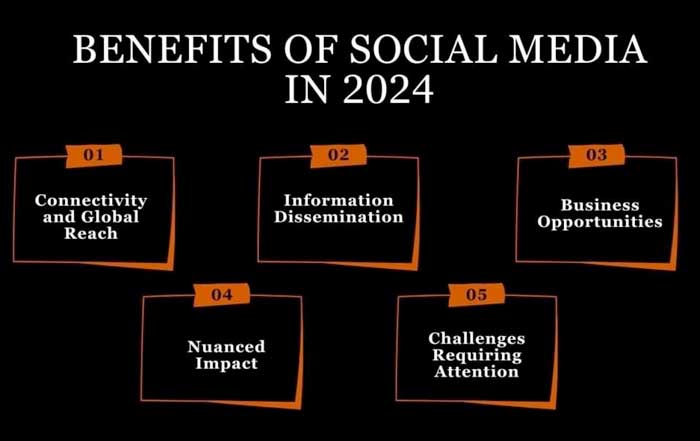In 2024, social media continues to thrive, with 5.17 billion users globally, representing 63.7% of the world's population. Daily usage averages 2 hours and 23 minutes per person, with users engaging on about 6.7 different platforms each month. The social media advertising market is projected to reach $219.8 billion, highlighting the increasing importance of digital marketing. Growth predictions suggest that the user base will expand to 5.85 billion by 2027, driven by emerging markets and the popularity of platforms like TikTok, which is expected to grow by 9.3% in 2024. As brands adapt, those leveraging AI and engaging content are likely to see significant returns on investment, with potential revenue increases of 25% from AI-enhanced customer service strategies. In the world of digital communication, social media has become an integral part of our daily lives, shaping how we connect, share information, and engage with brands governments and other people, it is essential to examine the advantages and disadvantages of social media to better understand its impact on individuals, businesses, and society as a whole.
Staying Connected: The Power of Social Media
One of the most significant advantages of social media is its ability to foster global connectivity by bridging communication gaps across demographics and professions. In a world where physical distance can often hinder personal relationships, social media platforms provide a convenient and accessible way for individuals to stay in touch with friends, family, and colleagues. Through these platforms, users can share updates, photos, and experiences, fostering a sense of community and belonging that transcends geographical boundaries.
Moreover, social media has become a powerful tool for businesses to engage directly with their target audience and build brand awareness. By leveraging the power of social media, companies can create targeted content, run advertising campaigns, and gather valuable data and analytics to understand consumer behavior and preferences. This direct interaction with customers has proven to be a cost-effective and efficient way for businesses to increase exposure, generate leads, and ultimately drive sales.
The Downside of Excessive Use
However, the excessive use of social media can also have negative consequences. One of the primary concerns is the impact on mental health, particularly among younger users. The constant exposure to carefully curated images and success stories can lead to feelings of inadequacy, envy, and low self-esteem. Additionally, the addictive nature of social media can result in decreased productivity, poor sleep quality, and reduced face-to-face interactions.
Another significant drawback of social media is the spread of misinformation and fake news. The ease with which content can be shared and the lack of fact-checking on some platforms have contributed to the proliferation of false information. This can lead to the formation of echo chambers, where users are exposed to content that reinforces their existing beliefs, and the polarization of public discourse.
The Impact on Society and Culture
Social media has also had a profound impact on society and culture. On the positive side, these platforms have become a powerful tool for social and political activism, allowing individuals and communities to raise awareness about important issues, mobilize supporters, and facilitate grassroots organizing. From the Arab Spring to the Black Lives Matter movement, social media has been instrumental in amplifying voices and bringing about real change.
However, the influence of social media on popular culture and societal norms has also raised concerns. The spread of viral content and trends can shape the way we think about beauty, fashion, and even language. While this can be a positive force in promoting diversity and inclusivity, it can also lead to the perpetuation of harmful stereotypes and the marginalization of certain groups.
Navigating the Future of Social Media
As we look towards the future of social media in 2024 and beyond, it is clear that the landscape will continue to evolve. The rise of new platforms and features, such as the explosive growth of TikTok and the emergence of audio-based platforms like Clubhouse, will likely shape user behavior and preferences. Additionally, the increasing focus on privacy and trust will require platforms and users alike to prioritize ethical data practices and transparent communication.
One of the most exciting developments in the world of social media is the convergence of e-commerce and social platforms, known as social commerce. As this trend continues to grow, we can expect to see more personalized shopping experiences, influencer-driven purchasing decisions, and the integration of augmented reality (AR) technology for virtual try-on experiences. This convergence of content and commerce has the potential to revolutionize the way we discover and purchase products online.
Striking a Balance
In conclusion, the pros and cons of social media in 2024 are complex and multifaceted. While these platforms offer unparalleled opportunities for connection, communication, and commerce, they also come with significant risks and challenges. As individuals and businesses navigate this evolving landscape, it is crucial to strike a balance between the benefits and drawbacks of social media.
For individuals, this may mean setting boundaries around screen time, being mindful of the content they consume, and prioritizing face-to-face interactions. For businesses, it may involve developing a strategic and targeted approach to social media marketing, focusing on building genuine connections with customers and prioritizing transparency and authenticity.
Ultimately, the value of social media in 2024 will depend on how individuals and businesses choose to engage with these platforms. By understanding the potential pitfalls and leveraging the power of social media responsibly, we can harness its potential to create a more connected, informed, and empowered world.


Social Media in 2024